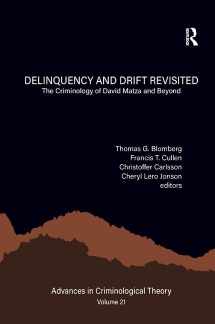
Delinquency and Drift Revisited, Volume 21: The Criminology of David Matza and Beyond (Advances in Criminological Theory)
ISBN-13:
9780367246501
ISBN-10:
0367246503
Edition:
1
Author:
Francis T. Cullen, Cheryl Lero Jonson, Thomas G. Blomberg, Christoffer Carlsson
Publication date:
2019
Publisher:
Routledge
Format:
Paperback
230 pages
FREE US shipping
Book details
ISBN-13:
9780367246501
ISBN-10:
0367246503
Edition:
1
Author:
Francis T. Cullen, Cheryl Lero Jonson, Thomas G. Blomberg, Christoffer Carlsson
Publication date:
2019
Publisher:
Routledge
Format:
Paperback
230 pages
Summary
Delinquency and Drift Revisited, Volume 21: The Criminology of David Matza and Beyond (Advances in Criminological Theory) (ISBN-13: 9780367246501 and ISBN-10: 0367246503), written by authors
Francis T. Cullen, Cheryl Lero Jonson, Thomas G. Blomberg, Christoffer Carlsson, was published by Routledge in 2019.
With an overall rating of 4.5 stars, it's a notable title among other
books. You can easily purchase or rent Delinquency and Drift Revisited, Volume 21: The Criminology of David Matza and Beyond (Advances in Criminological Theory) (Paperback) from BooksRun,
along with many other new and used
books
and textbooks.
And, if you're looking to sell your copy, our current buyback offer is $0.42.
Description
Fifty years ago, David Matza wrote Delinquency and Drift, challenging the ways people thought about the development of criminals. Today, Delinquency and Drift Revisited reminds criminologists that they ignore Matza’s writings at their own intellectual peril. Matza’s work shows his insights on a range of core criminological issues, such as: the complex nature of culture and its connection to criminality; the extent to which rule-breakers are truly different from the "rest of us"; the importance of focusing on human agency in understanding the subjective side of offending; the interaction of propensity and peer influences in criminal involvement; the role of the state in signifying individuals as deviant and entrapping them in criminal roles; and the processes that lead offenders to desist from crime. This volume was not written to pay homage to Matza, but to show how his ideas remain relevant to criminology today by continuing to question conventional wisdom, by making us pay attention to realities we have overlooked, and by inspiring us to theorize more innovatively.


We would LOVE it if you could help us and other readers by reviewing the book
Book review

Congratulations! We have received your book review.
{user}
{createdAt}
by {truncated_author}


